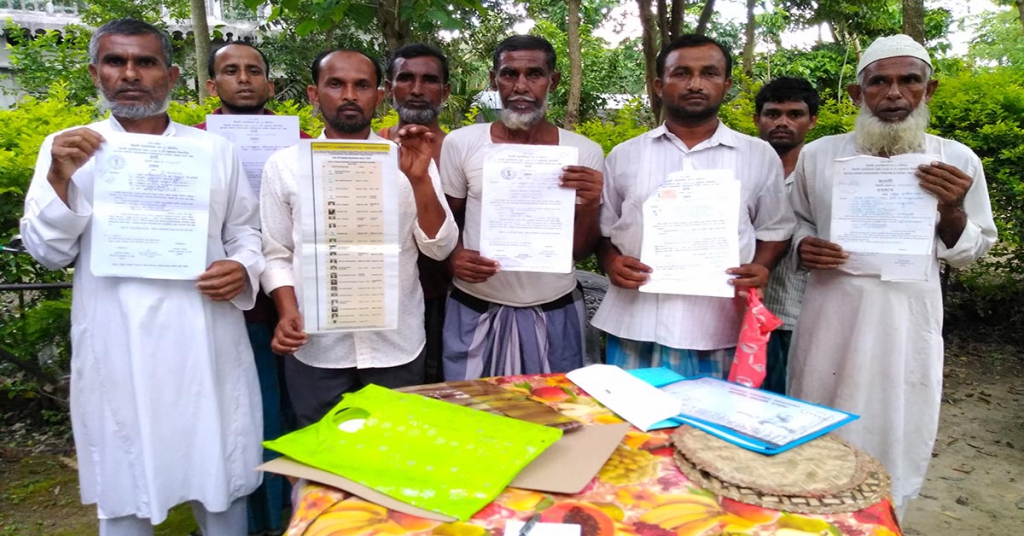Point Under Discussion: The discussion centers on the citizenship status of the brothers, sisters and other family relatives of Declared Foreigners and their consequent inclusion in the NRC list.
Conclusion: According to the existent statutory provisions, namely the Foreigners’ Act, 1946, read with the Foreigners’ (Tribunal) Order, 1964, the Superintendent of Police has to make a reference to the Foreigners Tribunal, regarding the brother, sister or any other family relative of a Declared Foreigner. Such a person shall not be included in the NRC List as long as the Foreigners Tribunal delivers its opinion in the favor of the proceede.
(A vast percentage of the Orders of the Foreigners Tribunals have been overturned by higher courts)
Summary:
The legal crux of the case arises from the petitioner’s challenge against the legality and validity of the order dated 31.10.2016, passed by the Foreigners’ Tribunal, Naga on declaring her a foreigner, who had illegally entered into India (Assam) from the specified territory after 25.03.1971.
The second writ petition lies against the decision of the Court directing the Superintendent of the Police to cause a fresh enquiry against the petitioner and thereafter to submit a fresh reference against her brothers and sisters based on the reasoning that if she was a foreigner, her brothers and sisters from the same father cannot be citizens of India.
The petitioner denied allegations before the tribunal, of being a foreigner by contending that she is a citizen of India by birth. She also deposed as her witness and exhibited 7 documents of proof. The petitioner had mentioned in her written statement that she was the daughter of Keramat Ali and granddaughter of Nurul Hussain and produced before the Court extracts of Voter’s list from 1966 and 1970 of Rupahihat Legislative Assembly Constituency wherein the names of her grandfather and father were mentioned respectively. She also produced two certificatesissued by Secretary of SaidoriaGaon Panchayat that certified she was the daughter of Keramat Ali and that she lived with her husband MdHarmuz at Bhelguri village post marriage.
However, the Tribunal ruled in favor of the State of Assam on 31.10.2016, on the ground that there was no admissible evidence establishing linkage of the petitioner with her parents or grandparents to a period prior to 25.03.1971, which is the cut-off date for detection of foreigners in Assam as per Section 6-A of the Citizenship Act, 1955.Also, it was held that the petitioner had failed her statutory duty under Section 9 of the Foreigner’s Act.
The Court underscored certain inconsistencies between the facts and the statement of the petitioner. It was pointed out that Nurul Hussain had been registered in 1966 Voter’s List at an age of 55 years which led the Court to hold a query as to the absence of Nurul Hussain’s name from the prior Voter List of 1947. Similarly, in the extract of 1970 Voter’s list appeared her father’s name but his age had been mentioned as 35 years which aroused further suspicion regarding the absence of the father’s name from the Voter list of 1966. The Court also pointed at the lack of disclosure of material facts from the petitioner concerning her age and where she was born. The petitioner remained silent as regards her mother as well as about her brothers and sisters. Though she mentioned Md Harmuz Ali as her husband, she did not mention when she got married and whether she had any children after marriage. Certain discrepancies were also found between the claimed ages of the petitioner’s relatives as opposed to their actual ages. Also, the court ruled that the print-outs of voter details of Keramat Ali and Nurul Hussain, were not certified copies of the original and had not been proved in accordance with law. Additionally, the Court refused to place reliance on the certificates produced by the petitioner, as the author of the certificates could not appear in the witness box to vouch for their truthfulness.
As regards to the second writ petition, the Court directed the Superintendent of Police (Border), Hojai, in its final order to cause an enquiry into the citizenship status of the petitioners. The Court expounded that under the scheme of Foreigners’ Act, 1946, read with the Foreigners’ (Tribunal) Order, 1964, a reference may be made by the concerned Superintendent of Police to the duly constituted Foreigners’ Tribunal if there is suspicion that the concerned person is a foreigner. The Court further stated that once the reference has been made to the Tribunal, it is required to give an opinion in favour of either the proceede or the State. It was further stated that once a proceedee is declared to be a foreigner it would only be a logical corollary to such declaration that his brothers, sisters and other family members would also be foreigners.Therefore the Court held that it becomes the duty of the jurisdictional Superintendent of Police to cause enquiry in respect of the brothers, sisters and other family members of the declared foreigners and thereafter, to make a reference to the competent Foreigners’ Tribunal against such brothers, sisters and other family members.
The original Gauhati HC judgement of May 2, 2017 may be read here:
*Kaumudi Srivastava is a legal intern with CJP. She is a fourth year student of Government Law College, Mumbai

